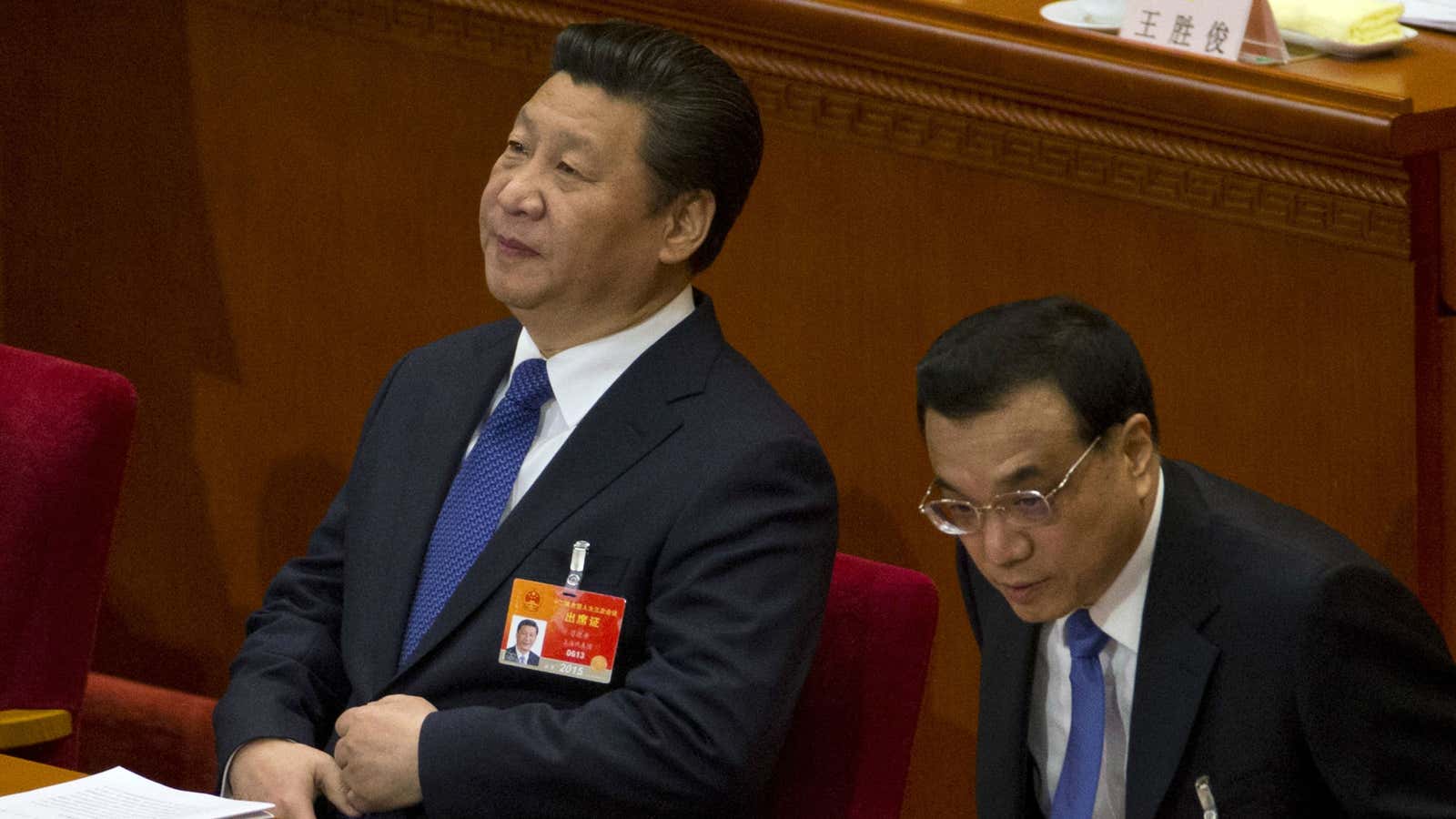Desperate times call for desperate measures. And after some $3.4 trillion in value was wiped off the Shanghai and Shenzhen stock markets in three weeks, the Chinese government was very clearly desperate. Fortunately, the rescue it launched this week—including stepping up state investment in stocks and pressuring lenders to roll over margin loans—seems to have worked. The Shanghai Composite benchmark index closed out the week up 11% from its Wednesday (July 8) nadir.
But as the dust settles, a nagging question emerges: How desperate are these times, really?
Despite the rout, going into the weekend the index was still up an eye-popping 14% in 2015—and 80% on a year ago. On top of that, Chinese equities are actually a tiny part of the financial system, and only a small minority of households actually own any. (In the US it’s about half—pdf, p. 18.)
But this was no TARP; there was no systemic risk. And probably no pitchfork-wielding mobs on the horizon.
What, then, was so important that Beijing had to call in the central bank? Here’s a roundup of the leading theories:
It’s the “Chinese Dream”
Rationale: A robust stock market is an essential part of the “moderately prosperous society” and program of “national rejuvenation” that president Xi Jinping’s “Chinese Dream” promises to create. This explains the brazen propaganda campaign over the last year urging people to buy stocks. Its credibility on the line, the government felt desperate to keep up its end of the bargain.
Likelihood: This is the most plausible theory, write Andrew Batson and Chen Long of research firm Gavekal, in a recent note. However, even considering Xi’s paternalist vainglory, a rescue for this reason still seems like overkill. For one thing, neither the rally nor the drop nor the bailout seem to have changed people’s impression of the market, says Andrew Collier, head of Orient Capital Research. “[T]here hasn’t been a backlash against the government for the current failures,” Collier argues in a note. “My guess is the average citizen just assumes the markets are [still] a casino.”
Mopping up debt and advancing market reform
Rationale: The state sector’s borrowing binge is dragging down the economy, upping the chance of a financial crisis. Soaring stock prices makes it easier for these firms to raise cheap capital and pay down debts—and for the government to start shedding its shares of state-owned companies. A booming stock market also makes it easier to finance the most vibrant part of the economy—smaller private companies—which the state-dominated bank system is terrible at.
Likelihood: It makes some sense that this might have influenced the stock evangelizing of China’s more market-minded leaders—Zhou Xiaochuan, the head of the People’s Bank of China (PBoC), for one. But by targeting stock prices, the stabilization plan undermines the entire point of a stock market, as Société Générale economist Wei Yao flags in a note. ”While this may have been a factor behind official approval of the earlier run-up, it would appear to have gone out the window with successive attempts to micromanage the stock market,” write Batson and Chen.
Attracting foreign money
Rationale: The debt-sodden financial system depends on a steady gush of fresh cash to keep it going, and foreign investors are one appealing source. A respectable stock market is a prerequisite for getting that to happen, notably for getting the IMF to add the yuan to its basket of reserve currencies, and for major global indexes to add Chinese stocks.
Likelihood: Seems implausible. If a tanking stock market is off-putting to foreign investors, a deus ex PBoC maneuver probably is too. “Imagine you’re a pension fund guy sitting in New York,” says David Cui, strategist at Bank of America/Merrill Lynch. “You’re going to be a lot more skeptical about buying A-shares in the future—whether they go up and down is often not driven by fundamental reasons, but on what the government does.” It’s hard to believe that even the State Council’s dimmer wits could possibly think otherwise.
Spoils for reform
Rationale: Gavekal’s Batson and Chen float this intriguing notion: that with the property market down and Xi’s anti-corruption crusade still in full swing, the government sees a bumping stock market as the lone way to pay off China’s elite so that they’ll back Xi’s reform agenda.
Likelihood: Though it’s entirely speculative, they say, it “seems increasingly plausible.”
What’s really going on?
Sadly, none of these are wholly satisfactory explanations of why Beijing would go to such risky lengths to buoy stocks. There might be a trend in this inconsistency, though.
The over-eager stock-market rescue is maybe not so different from the bungled handling of local government debt restructuring (paywall). Or perhaps most of all, the policy bumbling that caused that alarming cash crunch in June 2013.
“[I]t’s clear that the stock market bailout is another example of confusion at the top,” writes Orient Capital’s Collier, “and a tug and pull between several factions.”
That seems to have resulted in a gross miscalculation of how much borrowed money was driving the stock market—and, for that matter, of how much control the government actually has over markets. Whatever’s happening at the top, it’s not making times any less desperate.
